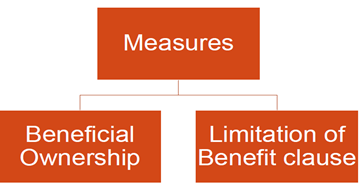MEASURES FOR ANTI – TREATY SHOPPING IN TAX TREATIES

BENEFICIAL OWNERSHIP
The concept of “beneficial owner” implies, that the concessional withholding tax benefit, under a Treaty, shall be available to the legal owner, only if he is also the beneficial owner of the income, or the beneficial owner is a resident of the same state .
Klaus Vogel has defined that the beneficial owner of income is a person who : –
- Has the right over the capital or other asset, and decide who should be allowed to use it ; or
- Has right over the income and use of such income ; or
- Has both the rights discussed above.
For example, let us look at the following clause of Article 12 – Royalties and Fee for Technical Services of the India Singapore Treaty : –
ARTICLE 12
ROYALTIES AND FEES FOR TECHNICAL SERVICES
- Royalties and fees for technical services arising in a Contracting State and paid to a resident of the other Contracting State may be taxed in that other State.
- However, such royalties and fees for technical services may also be taxed in the Contracting State in which they arise and according to the laws of that Contracting State, but if the recipient is the beneficial owner of the royalties or fees for technical services, the tax so charged shall not exceed 10 per cent.]
In clause 2 of Article 12, the benefit of 10% is available only when the .recipient is the beneficial owner of the royalties or fees for technical services
LIMITATION ON BENEFIT CLAUSE (LOB)
LOB clause, is specific anti “treaty shopping” clause, which limits the Treaty benefits, to residents of either of the contracting states. The residents of third countries, are not allowed to use the Tax Treaty between two states. “Limitation on benefit” concept can include the following : –
- Condition of “beneficial ownership” should be satisfied by the recipient of the income .
From Indian perspective let’s take an example of Article 24 of DTAA between India and USA. The same reads as under.
1. A person (other than an individual) which is a resident of a Contracting State and derives income from the other Contracting State shall be entitled under this Convention to relief from taxation in that other Contracting State only if:
a) more than 50 per cent of the beneficial interest in such person (or in the case of a company, more than 50 per cent of the number of shares of each class of the company’s shares) is owned, directly or indirectly, by one or more individual residents of one of the Contracting States, one of the Contracting States or its political sub-divisions or local authorities, or other individual subject to tax in either Contracting State on their worldwide incomes, or citizens of the United States; and
b) the income of such person is not used in substantial part, directly or indirectly, to meet liabilities (including liabilities for interest or royalties) to persons who are not resident of one of the Contracting States, one of the Contracting States or its political sub-divisions or local authorities, or citizens of the United States.
- The provisions of paragraph 1 shall not apply if the income derived from the other Contracting State is derived in connection with, or is incidental to, the active conduct by such person of a trade or business in the first-mentioned State (other than the business of making or managing investments, unless these activities are banking or insurance activities carried on by a bank or insurance company).
- The provisions of paragraph 1 shall not apply if the person deriving the income is a company which is a resident of a Contracting State in whose principal class of shares there is substantial and regular trading on a recognized stock exchange. For purposes of the preceding sentence, the term “recognized stock exchange” means :
a) In the case of United States, the NASDAQ System owned by the National Association of Securities Dealers, Inc. and any stock exchange registered with the Securities and Exchange Commission as a national securities exchange for purposes of the Securities Act of 1934;
b) In the case of India, any stock exchange which is recognized by the Central Government under the Securities Contract
c) Regulation Act, 1956; and
d) Any other stock exchange agreed upon by the competent authorities of the Contracting States.
- The recipient should be “Subject to tax’’ ( as against “liable to tax” condition in certain Treaties ) in the Country to be eligible as a resident for Treaty purpose . This would imply, that if a person has not been subjected to tax in a country, he would not qualify as a resident of that country, and would accordingly not be eligible to claim the benefit of such treaty.
- Specific conditions, which may be required to be fulfilled to claim exemption for a particular category of income.
- Specific Article on Limitation on benefit generally dealing with conduit entities. For example, ARTICLE 24A of the India Singapore Treaty deals with the case of a shell or conduit company and provides as under : –
- …..
- A shell or conduit company that claims it is a resident of a Contracting State shall not be entitled to the benefits of paragraph 4A or paragraph 4C of Article 13 of this Agreement. A shell or conduit company is any legal entity falling within the definition of resident with negligible or nil business operations or with no real and continuous business activities carried out in that Contracting State.
- A resident of a Contracting State is deemed to be a shell or conduit company if its annual expenditure on operations in that Contracting State is less than S$ 200,000 in Singapore or Indian Rs. 5,000,000 in India, as the case may be:
(a) in the case of paragraph 4A of Article 13 of this Agreement, for each of the 12-month periods in the immediately preceding period of 24 months from the date on which the gains arise;
(b) in the case of paragraph 4C of Article 13 of this Agreement, for the immediately preceding period of 12 months from the date on which the gains arise.
- A resident of a Contracting State is deemed not to be a shell or conduit company if:
(a) it is listed on a recognised stock exchange of the Contracting State; or
(b) its annual expenditure on operations in that Contracting State is equal to or more than S$ 200,000 in Singapore or Indian Rs. 5,000,000 in India, as the case may be:
(i) in the case of paragraph 4A of Article 13 of this Agreement, for each of the 12-month periods in the immediately preceding period of 24 months from the date on which the gains arise;
(ii) in the case of paragraph 4C of Article 13 of this Agreement, for the immediately preceding period of 12 months from the date on which the gains arise.
- LOB clause applies to non-individuals, as individual cannot indulge in treaty shopping.
IMPORTANCE OF LOB CLAUSE IN TAX TREATY WITH INDIA
The Hon’ble Supreme Court of India, in Azadi Bacho Andolan case, has held that in cases, when there is no inherent anti-abuse rule in Indian tax treaties, Treaty benefit cannot be denied unless a specific Limitation on Benefit clause in the treaty itself is present. India has, subsequent to this decision, negotiated and included LOB clause in some of its tax treaties, like with those with Singapore & UAE.
For any queries, please write them in the Comment Section or Talk to our tax expert




